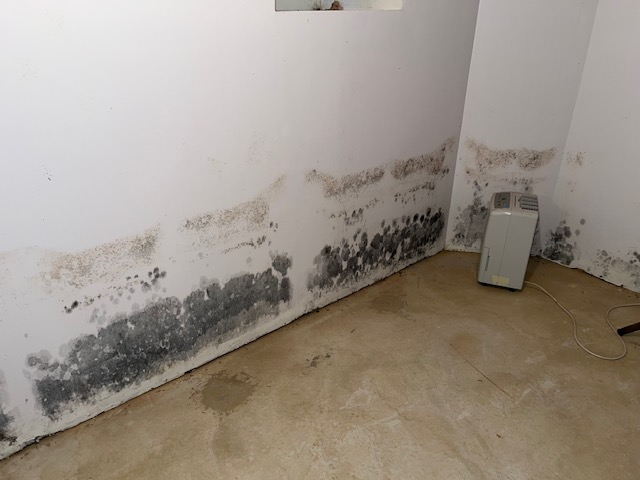
The association of mold and basements go hand-in-hand. Typically, when we hear the term “mold”, our mind jumps to basements or crawl spaces. It is very common to find mold in basements, but why?
To start, mold develops in areas with a source of moisture and lack of ventilation. Whether your basement is finished or unfinished, it is very important to consider the different sources of moisture that could result in mold growth. The longer the source of moisture is present, the more likely the mold will colonize and produce mycotoxins.
Sources Of Moisture In Basements
Generally, most homes are built with their mechanical units (HVAC) and plumbing units (boiler, water heater, furnace, etc.) in the basement. All of these units are subject to fail at some point due to age, or if they are not installed properly/carefully maintained. Significant water damage can occur when a unit leaks. If it is not cleaned or dried in a timely manner, mold will begin to develop.
The most common cause of mold in basements is elevated humidity levels. Here on Long Island, the water table is constantly rising and falling, based on the tides and the geology of the area. Keep in mind that humidity is just as much of a moisture source as a leaking pipe. We recommend maintaining 35% – 50% humidity levels in your basement at all times, especially during the summer months. To achieve this, we recommend utilizing dehumidifiers with an automatic shut-off when the desired humidity level is reached. Do not forget to empty the bucket! Check out this dehumidifier with a self-draining pump!
Although the concrete foundation walls and floor may seem dry, they tend to hold on to moisture for a long-time. Any porous material (cardboard boxes, wood, leather, etc.) in-contact with the concrete, will begin to draw moisture from it. Overtime, the porous material will absorb the moisture and will allow for mold to flourish. We recommend storing all items on plastic or metal shelving units. Plastic and metal are nonporous materials that are impervious to water.
Finishing A Basement
If you choose to finish your basement, be mindful of the different building materials available. The most obvious type of flooring material to install in naturally damp areas, is tile. There is a reason why it is used in kitchen and bathrooms, it is very water resistant. There are water resistant drywall material that can be used in basements as well. Don’t rely on a contractor to deliver the right products for you.
Many contractors are aware of the building standards that must be practiced for finishing a basement. Here a a few things to keep in mind before finishing a basement:
- Firstly, repair any cracks in the foundation walls.
- Secondly, pitch the soil away from the foundation walls.
- Extend downspouts away from the foundation walls.
- Maintain and clean gutters accordingly.
- Drywall should not be installed in-contact with concrete (floors or foundation walls)
For additional information regarding mold in basements, check out our website, or give us a call at (631) 562-8440.

TDL’s facility houses advanced CNC machines, enabling the precise manufacturing ߋf complex components.